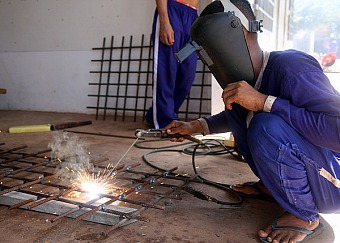New prison labor rules a positive step, but do not go far enough
Published on 9 May 2012New government regulations take the important step of banning the export of prison-made goods, but fall short of fully protecting inmates from exploitation by private firms, according to a new briefing from LICADHO.
The ban on exports was implemented by the "Inter-ministerial Prakas on the Prohibition of Using Prison Labor for Producing Export Goods," signed on March 19. The prakas, a form of ministerial directive, comes just three months after Cambodia enacted a controversial new prison law permitting private firms to use prison labor. LICADHO recommended prior to the passage of the law that the provision be scrapped.
Just prior to the law's passage, several media outlets reported that Cambodian prisoners had been employed by private firms to manufacture and embellish garments since at least 2009. Some of the items were apparently intended for export to Western firms.
LICADHO believes that the export ban is an important step in protecting Cambodia's reputation as a reputable supplier in the international garment industry. But the prakas fails to fully ban private firms from using prison labor for domestic production, which leaves prisoners open to systematic rights violations.
"International law bans the use of forced labor by private firms - it doesn't matter if the firm is exporting its goods or producing for domestic production," said LICADHO Director Naly Pilorge.
"The law permits prisoners to volunteer for such work, but also requires that specific protections be in place to ensure that the work is indeed voluntary," Pilorge said. "Right now, Cambodia has none of these protections, and it's not clear the prison system is capable of implementing them."
According to the International Labor Organization, prisoners may perform work for private entities if there are certain indicators of a "free employment relationship." For example, the inmate must give formal consent to work, in writing, with the consent form indicating wages and conditions of work. LICADHO research indicates that such consent forms are not used and are not specifically mandated by domestic law.
LICADHO also believes that prevailing prison conditions in Cambodia make it difficult for prisoners to give true voluntary consent. Inmates are routinely deprived of the most basic fundamentals, including adequate food and water, time out of their cells, health care, and personal security. Many of these "privileges" must be purchased.
"It's difficult to imagine a scenario where Cambodian inmates are truly engaging in a 'free labor relationship,' " said LICADHO President Pung Chhiv Kek. "They live in desperate conditions which make them ripe for exploitation."
The briefing paper also addresses a handful of other issues with the ban, including a vague "repeat offender" provision, and the inherently weak legal force of a prakas.
"It's disappointing that a critical point of law had to be promulgated via a prakas, rather than in the prison law itself," Kek said. "Prakas are neither as strong as actual legislation nor as difficult to amend or revoke. We still believe the prison law should be amended to address the problems with prison labor."
For more information, please contact:
▪ Dr. Pung Chhiv Kek, President of LICADHO (French, English, Khmer) - 012-802-506
▪ Ms. Naly Pilorge, Director of LICADHO (French, English) - 012-803-650
▪ Ms. Nget Sokun, Prison Project Supervisor (Khmer) - 016-797-305
PDF: Download full statement in English - Download full statement in Khmer
- Topics
- Prison/Detention








